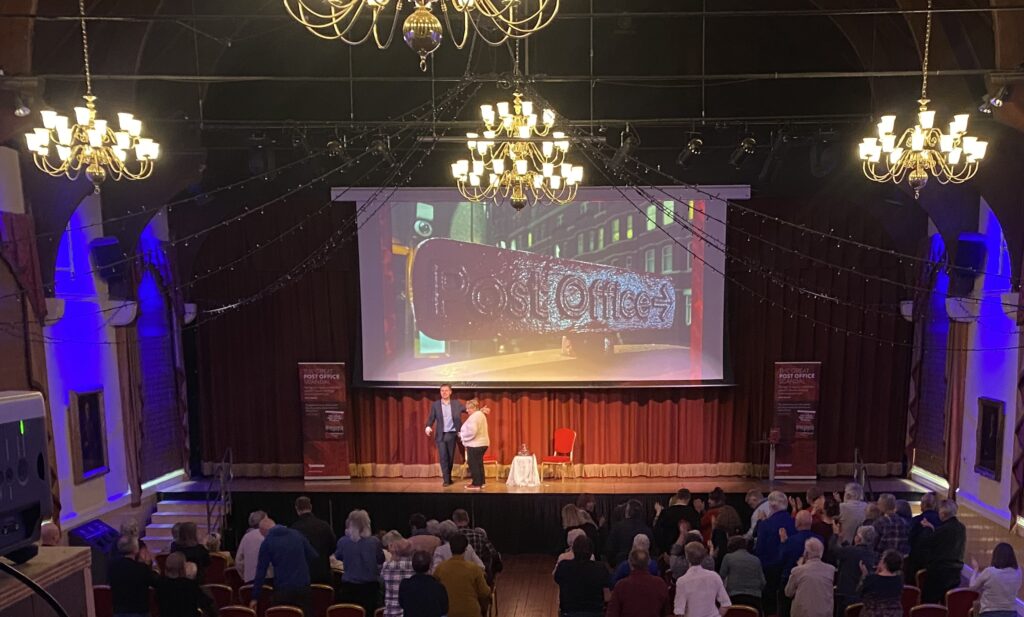
This is Penny Williams. Penny ran the Manaccan Post Office in Cornwall between 2007 and 2013.
I have just come off stage with Penny at Launceston Town Hall where she spoke about her experiences at the hands of the Post Office.
During our conversation, Penny revealed she has paper evidence of what appears to be fraudulent back-end transactions at her Post Office. That is, computer printouts showing that money was withdrawn from her accounts, over a period of twelve months to 2013, during times when the branch was closed and no one was logged on to her Horizon IT terminal.
The Story
After a successful tenure as Manaccan Subpostmaster, Penny was selling up. She had run the branch without a problem for six years and fancied a change.
In September 2013, whilst she was away supply teaching, Post Office auditors descended on her branch and started an audit. Penny was contacted by phone after the audit and told she was £20,000 short. Penny was suspended pending an investigation. The Post Office wanted to know how she proposed to settle the outstanding amount.
Penny was alarmed. She had been audited eighteen months previously and there were no problems. Rather than settle the amount, Penny asked the Post Office to show her how and where this discrepancy had arisen. The Post Office refused, instead they invited her to interview under caution.
Penny asked if she could bring her lawyer. The Post Office again refused, so Penny declined the invitation and reiterated her suggestion the Post Office provide her with evidence of the negligence, carelessness or error which caused the £20,000 deficit. Penny used to work for Morgan Stanley.

That’s not to say she wasn’t in some distress. Penny knew the St Keverne Subpostmaster, Sue Knight, who was being prosecuted by the Post Office. Penny rang Sue and Sue put her in touch with Alan Bates from the Justice for Subpostmaster’s Alliance. Alan put Penny on his mailing list and told her to make sure any communication and correspondence from the Post Office went through her lawyer.
Penny began to receive letters from the Post Office’s debt recovery team, who demanded she give them £20,000. Penny held out, but her suspension had an immediate effect. The deal to sell the Post Office fell through. Rumours she was a thief spread round the community. People stopped coming into her shop and the pub she ran as a tenant landlady. Her income dried up.
The mysterious packet
Whilst all this was happening, Penny received a packet in the post. A brown envelope filled with dot-matrix computer printouts which appeared to be financial data relating to her branch. There was no covering letter.
Penny recognised some of the transaction data, but there was a lot of information requiring a proper forensic examination. She gave it to her sister, who worked in the payroll department of a major UK plc. Penny’s sister and her boss, a qualified accountant, began to work through the documents. According to Penny, they established beyond doubt that over the months covered by the printouts, during periods when the branch was closed, hundreds of small debit transactions (Penny mentioned a recurring £29 and the occasional £14.65) were being made at her branch. They added up to more than £16,000.
In 2014, Penny was made bankrupt by HMRC. Her pub was taken from her. Due to the internal ramifications of the independent investigation by Second Sight, the Post Office had decided to stop prosecuting people, so she was “lucky” in that respect (Sue Knight’s prosecution was dropped because, she was told, it was no longer in the public interest, without further explanation).

Penny was left to pick up the pieces of her life and career, which she did by continuing to teach, eventually turning her hand to pie-making. Penny’s Pies has become a successful business with a shop in Falmouth, an outlet at the Great Cornish Food Store in Truro and a dedicated pasty and pie-making facility in Helston (pictured).
Penny still has possession of the computer printouts. She still doesn’t know who sent them or why. I have asked if I can possibly have sight of them. If they corroborate her sister’s interpretation, she is sitting on a national news story and possibly the first concrete evidence of internal fraud at the Post Office during the Horizon IT scandal.
Penny, who very kindly brought some of her delicious pasties for us to sample after her talk, has said she will try to dig out the documents as soon as possible.
I am currently touring Post Office Scandal – the Inside Story. Please do come and see us as we make our way around the country (all dates here). I’ll be at the Acorn in Penzance with Penny once more at 7.30pm tonight. Come and hear her story.
The journalism on this blog is crowdfunded. If you would like to join the “secret email” newsletter, please consider making a one-off donation. The money is used to keep the contents of this website free. You will receive irregular, but informative email updates about the Post Office Horizon IT scandal.

Leave a Reply